How to Index Backlinks Faster in Google
Nov 20, 2024
Written by Casey Bjorkdahl

Casey Bjorkdahl is one of the pioneering thought leaders in the SEO community. In 2010, Casey co-founded Vazoola after working for a Digital Marketing Agency for five years in New York City. Vazoola is now one of the fastest growing and most widely recognized SEO marketing firms in the country.
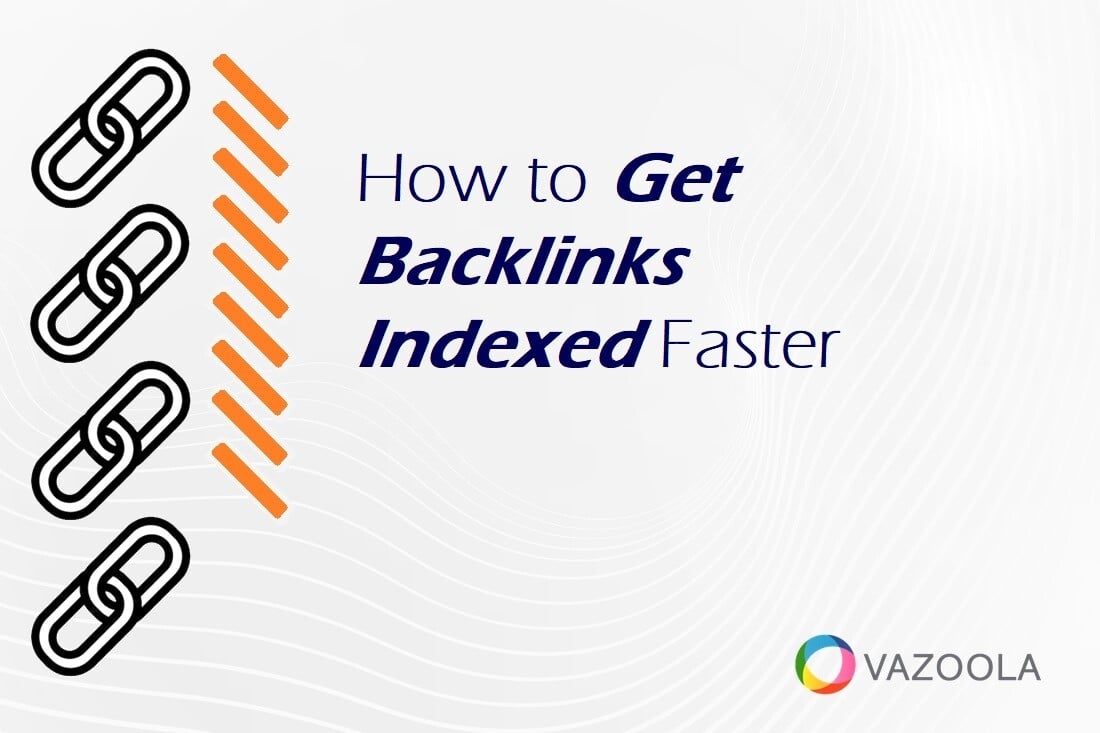
Link building efforts can’t succeed if backlinks aren’t recognized – indexed – by search engines.
Backlink indexing occurs when search engines like Google discover, crawl, and ultimately catalog backlinks into their vast databases, thereby recognizing a website's authority and relevance.
Here at Vazoola, we've seen firsthand the benefits of faster indexing. It can lead to a quicker impact on rankings and enhance your site's visibility. Most importantly, it can more efficiently drive targeted traffic to your site.
Key Takeaways:
-
Backlink indexing is a crucial step in SEO that involves search engines recognizing and cataloging your backlinks, directly impacting your site's authority and search rankings.
-
Manual backlink submissions to Google Search Console and Bing Webmaster Tools can significantly expedite indexing.
-
A combination of indexing tools and backlink pinging services can help alert search engines to new backlinks, particularly for platforms like Bing and Yandex.
-
A robust social media strategy, especially leveraging platforms like X, formerly known as Twitter,, can enhance the visibility of your content and speed up the backlink indexing process.
-
Publishing high-quality, engaging content naturally attracts more links and encourages search engines to crawl and index your site more frequently.
-
An optimized internal linking structure can guide search engine bots more efficiently, helping them discover and index backlinks quicker.
-
Regular monitoring with backlink checker tools is key to maintaining a healthy, effectively indexed backlink profile.
Table of Contents
Know Your Indexing Basics
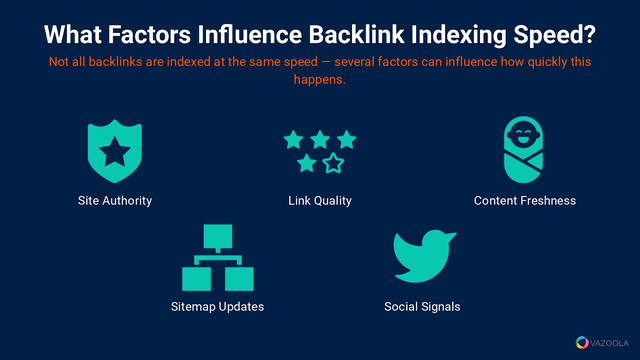
Understanding the mechanics behind search engines’ operation is key to mastering SEO.
Essentially, search engines use automated programs known as “crawlers” or “bots” to scour the internet for content. When the crawlers find a new link pointing to your site, that link is then “crawled,” and – assuming it meets certain criteria – “indexed.”
Indexing means it's added to the search engine's database and considered in your site’s ranking calculations.
However, not all backlinks are indexed at the same speed — several factors can influence how quickly this happens.
Factors influencing indexing speed include:
-
Site Authority: High-authority sites are crawled more frequently, thereby indexing backlinks faster..
-
Link Quality: High-quality links from relevant, well-regarded sources are prioritized for indexing over lower-quality links.
-
Content Freshness: Regularly updated websites encourage search engines to crawl and index new backlinks more quickly.
-
Sitemap Updates: A current sitemap submitted to search engines can alert them to new backlinks for faster indexing.
-
Social Signals: Shares and mentions across social media platforms can speed up the discovery and indexing of new backlinks.
How to Index Backlinks Fast
Acceleration of backlink indexing is a crucial step toward SEO success. By ensuring that search engines quickly discover and acknowledge your site's backlinks, you can enhance your site's visibility and ranking faster.
Here at Vazoola, we've explored a variety of strategies to speed up this process, drawing from our extensive experience to recommend effective practices.
1. How to Get Links Indexed by Google Manually
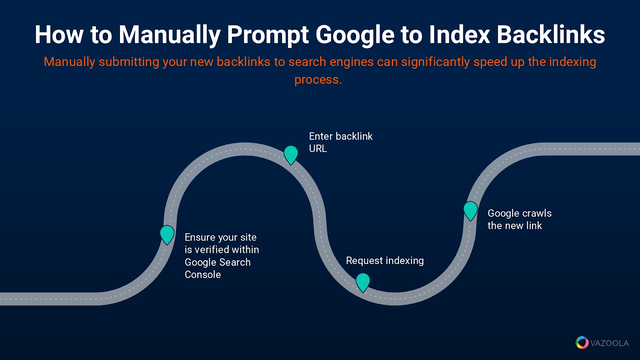
Manually submitting your new backlinks to search engines can significantly speed up the indexing process.
How do you submit links to search engines? While it varies by by search engine, we’ve broken down the process for Google and Bing:
Google Search Console: Ensure your site is verified within Google Search Console to access its features. Then just enter the URL where your backlink is located and request indexing. Doing so tells Google to crawl the new link.
Bing Webmaster Tools: Similar to Google, start by verifying ownership of your site in Bing Webmaster Tools. Use the “Submit URLs” feature to inform Bing about the page containing your backlink for faster indexing.
2. How to Index Links in Google with Indexing Tools
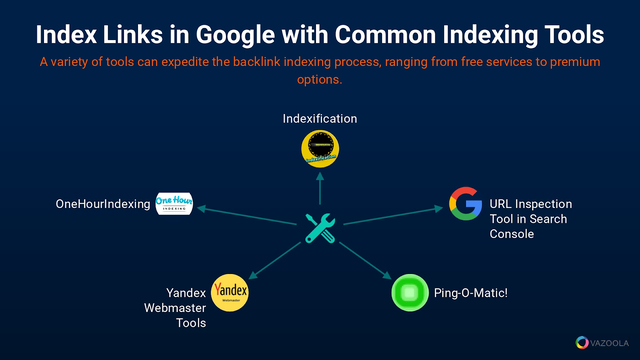
“How do I ping my links?” you might ask.
Several tools can help expedite the ping backlinks and backlinks indexing process, ranging from free services to premium offerings:
-
"Fetch as Google,” now part of the URL Inspection Tool in Search Console: The tool allows you to request a crawl of individual URLs.
-
Indexification: This resource specializes in getting your backlinks indexed by creating short URLs and pinging them.
-
OneHourIndexing: The platform aims to get links indexed in about an hour through its unique method.
-
Ping-O-Matic!: This free tool backlink pings multiple search engines to notify them of your site updates.
-
Yandex Webmaster Tools: Similar to Bing and Google, the backlink pinger service offers features to submit URLs directly for indexing.
3. Employ Link Pinging Tools to Submit Backlinks to Google
Backlink pinging tools can be useful for notifying some search engines like Bing and Yandex about new backlinks.
Pinging services can be part of a broader strategy to ensure all search engines, especially those participating in the "Index Now" protocol like Bing and Yandex, are aware of new content and links.
4. Follow a Social Media Strategy for Submitting a Link to be Indexed on Google
Leveraging social media platforms, particularly X, formerly known as Twitter, can aid in quicker backlink indexing.
Share new content containing backlinks on Twitter, Instagram and other platforms. By employing relevant hashtags and engaging with your audience, you organically increase visibility and the likelihood of the content being crawled more quickly.
Pro Tips:
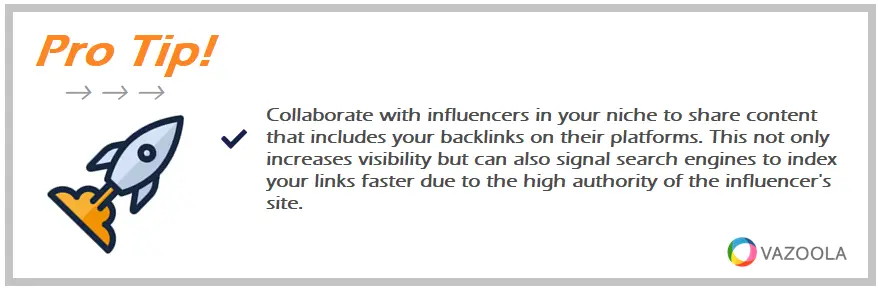
Collaborate with influencers in your niche to share content that includes your backlinks on their platforms. This not only increases visibility but can also signal search engines to index your links faster due to the high authority of the influencer's site.
5. Publish High-Quality Content for Better Backlink Indexing
Creating content that naturally attracts links and prompts search engines to crawl your site more frequently is key to expedient link indexing.
Link-worthy, high-quality content encourages natural backlinking, prompting search engines to index these links faster due to the content's inherent value and shareability.
Pro Tips:
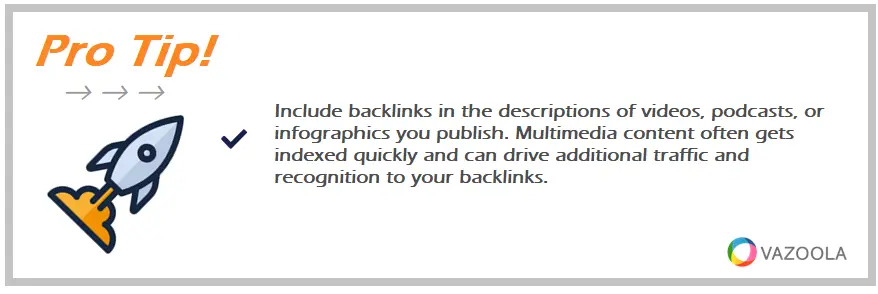
Include backlinks in the descriptions of videos, podcasts, or infographics you publish. Multimedia content often gets indexed quickly and can drive additional traffic and recognition to your backlinks.
6. Focus on Internal Linking for Better Backlink Indexing
A smart internal linking strategy can guide search engine crawlers to discover new backlinks more efficiently.
By linking to your own content where backlinks are located, you help search engine bots navigate your site and recognize new links, enhancing indexing speed.
Pro Tips:
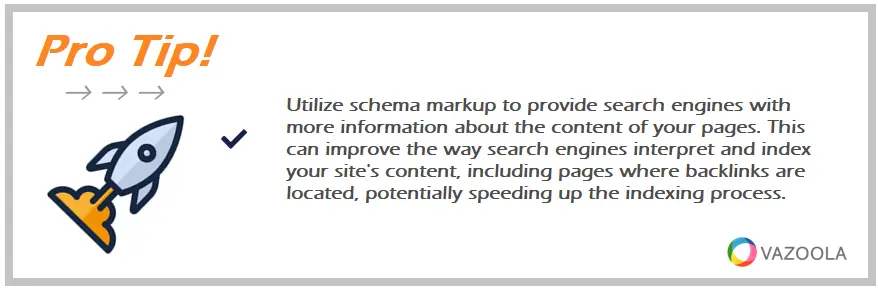
Utilize schema markup to provide search engines with more information about the content of your pages. This can improve the way search engines interpret and index your site's content, including pages where backlinks are located, potentially speeding up the indexing process.
Link Index Monitoring and Troubleshooting
How do you check if Google indexed a linked page? How do you find links that have been indexed by Google?
After all, ensuring your backlinks are recognized and indexed by search engines is pivotal for SEO success.
However, the process isn't always straightforward, and it often requires diligent link monitoring and troubleshooting to identify and rectify any issues.
Here at Vazoola, we’ve developed a robust approach to keep tabs on our backlinks' indexing status and tackle common hurdles effectively.
Use Backlink Checker Tools
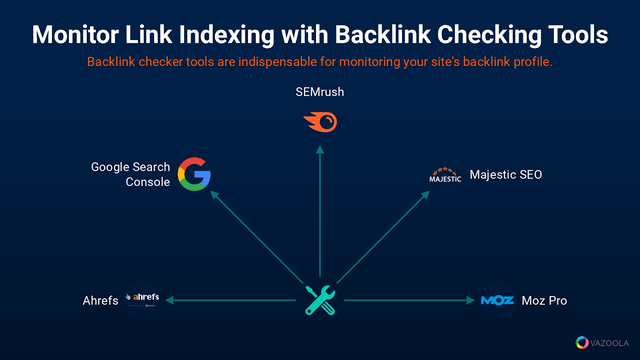
Backlink checker tools are indispensable for monitoring your site's backlink profile. The following tools provide insights into which of your backlinks are recognized by search engines:
-
Ahrefs: The Ahrefs platform offers a comprehensive suite for backlink analysis, tracking the status and health of your backlinks with precision.
-
SEMrush: The online tool not only tracks your backlinks but also provides analytics on the value and impact they have on your SEO efforts.
-
Moz Pro: Renowned for its Domain Authority metric, Moz Pro helps in evaluating the quality of backlinks and their indexing status.
-
Majestic SEO: Majestic focuses on backlink analysis, offering detailed reports on your site’s link profile and the indexing status of backlinks.
-
Google Search Console: A free tool by Google, the search console provides data on your site's backlinks, including which ones are recognized and indexed by Google.
Address Common Indexing Issues
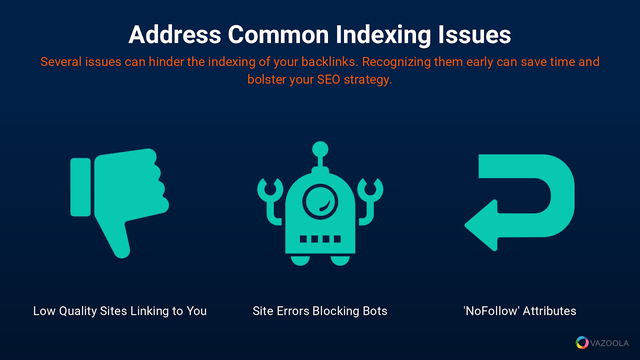
Several issues can hinder prompt backlink indexing. Recognizing the following early can save time and bolster your SEO strategy:
-
Low-quality sites linking to you: Backlinks from spammy or irrelevant sites can negatively impact indexing and SEO performance.
-
Site errors blocking bots: Errors on your site can prevent search engine bots from crawling and indexing your backlinks efficiently.
-
"Nofollow" attributes: Backlinks with the "nofollow" attribute instruct search engines not to follow or index the link, limiting their SEO value.
Waiting vs. Action: When to Be Patient, When to Troubleshoot
Understanding the balance between patience and proactive troubleshooting also is key to SEO success.
While search engines may take time to index new backlinks, extended delays might signal underlying issues requiring attention.
Just how do you know if a link is truly indexed by Google?
Here at Vazoola, we recommend a measured approach—monitor your backlinks' indexing status with the tools mentioned, and if you notice anomalies or extended indexing times, start troubleshooting.
This dual strategy ensures you're not passively waiting when action is needed, optimizing your site’s SEO performance and backlink efficacy.
Know How to Index Backlinks Quickly
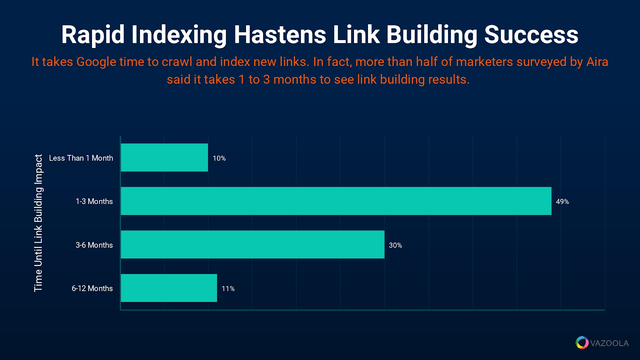
If you plan to amplify your site’s visibility and search ranking, you must ensure your backlinks are indexed efficiently. After all, it takes Google time to crawl and index new links.
How long does it take for backlinks to show up in a web crawl? Just how long does it take Google to index a link?
More than half of marketers surveyed by Aira said it takes 1 to 3 months to see link building results. The good news is a delay doesn’t mean Google stopped indexing links.
Drawing from our extensive experience, we've pinpointed several key actions that can accelerate this process.
Combined, the strategies underscore the importance of a multifaceted approach to SEO, where quality content, smart navigation, and proactive engagement with search engines converge to boost your online presence.

